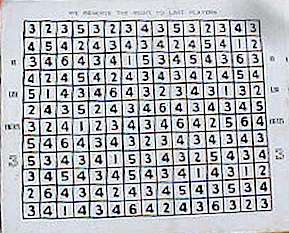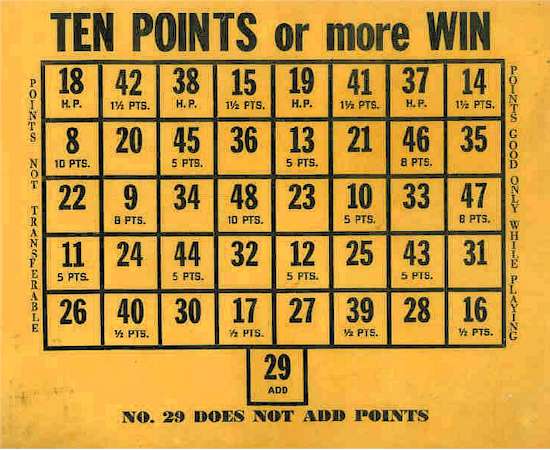

This is a page from my e-book
"On the Midway" available HERE

Razzle Dazzle
 This
game, no matter what name it goes under, is the one Matthew Gryczan, in Carnival
Secrets, calls "the most vicious game on the midway." Never
play this game,
or any other game that claims to award money as a prize, or
any game that displays very expensive prizes like television sets, etc. Do you think the agent
is in business to give any of those things away?
This
game, no matter what name it goes under, is the one Matthew Gryczan, in Carnival
Secrets, calls "the most vicious game on the midway." Never
play this game,
or any other game that claims to award money as a prize, or
any game that displays very expensive prizes like television sets, etc. Do you think the agent
is in business to give any of those things away?
It's usually dressed up as a "football" game in which the player must scores a specific number of "yards". There is no mechanical gaff, the deception happens right to your face. You play to accumulate points that lead to a winning prize. A game may use any method of attempting to score: dice, or multi-sided logs called "baffle blocks", but most often scored by spilling 8 marbles from a cup onto a game board with about 120 numbered holes. The numbers are added up to a total which the jointee compares to a conversion chart to determine the number of points or "yards" scored. The numbers most likely to come up are worthless or only indicate that the player must add to, or even double, his cash bet. The chart, what carnys call a 'razzle board', is incomprehensible to the player, who must believe the flattie's constant patter claiming that a win is almost within reach with just one or two more bets. The cost per game builds up exponentially and the winning score is claimed to almost within reach for a big payoff. Whatever the premise and whatever the game is called, all razzle games use a conversion chart to translate the player's score into a final number, and all call for play-by-play cost buildups.
The object of the game is dual: to win small prizes by hitting certain small totals, which pay off in prizes and small amounts of cash, and to accumulate an exact number of points as you continue to play for the big payoff. The chart is clearly posted, but so confusing that, early in the game when the agent says you're scoring big points, you get in the habit of letting him do the converting. The agent controls the game by miscounting the score when he pleases, and on your first plays, he will always give you a good score. You have "advanced the ball" perhaps 20 yards! You're already caught — in many cases, you can only score via a miscount (any score you can possibly roll grants you no points), so it can be fairly shown that your roll scores zero on the chart.
You are told you've
hit a "special" or a "bonus number" or one of those "H.P."
spaces (as on the yellow razzle chart, whatever "H.P." means) Just one play, and you win two for one —
you get back your dollar plus a second dollar and a stuffed bear! Now comes the
next play, and the big payoff rises to  $20, and the fee is just 10% of that, or
$2. And you win again! And all the time you're accumulating "yards" or
"points" to the big payoff goal. The next play costs 10% of the next
higher $50 payoff, or $5, and the
play thereafter costs $10, and you keep accumulating points but perhaps you lose
the smaller proposition once or twice. Before long, you're paying $50 for a try,
and getting awfully close to that goal for the $500 payoff, and just as you show
signs of becoming discouraged, the agent miscalls in your favor, giving you some
more big yards. But once you get very close to a winning score, you'll never
score again, guaranteed.
$20, and the fee is just 10% of that, or
$2. And you win again! And all the time you're accumulating "yards" or
"points" to the big payoff goal. The next play costs 10% of the next
higher $50 payoff, or $5, and the
play thereafter costs $10, and you keep accumulating points but perhaps you lose
the smaller proposition once or twice. Before long, you're paying $50 for a try,
and getting awfully close to that goal for the $500 payoff, and just as you show
signs of becoming discouraged, the agent miscalls in your favor, giving you some
more big yards. But once you get very close to a winning score, you'll never
score again, guaranteed.
The play is captivating to the greedy, and there are agents who specialize in "the send" … hooking players so badly that, taken for every penny in their pockets, they are very kindly allowed to keep the game on "hold" while they go home to get more! (Ain't ATMs wonderful?) But what if you suddenly wake up to the tomfoolery? What if you realize you're being fleeced? What if (shudder! cringe!) you come back with the cops? Well, for what will turn out to be a very small percentage of the money he's taking in, that nasty man can admit the error of his ways and give you one of his most flashy prizes, which is worth a lot less than you imagine. After all, the night is long and the lot is full of marks just like you.
Let me state flatly: there is no such thing as an honest razzle dazzle game! If you see a conversion chart, do not play the game at all! If you are being built up to more expensive plays, abandon the money you have lost and walk away!
Writing for men's magazine Cabaret in 1957, Jay Mallin described the game as a leading problem at old-time Havana's best-known night-spot: "Razzle-dazzle is a country carnival game, employing eight dice and a board, in which the customer has about one chance in a thousand of winning anything. But a glib spiel on the part of the attending croupier convinces the unwary that exactly the reverse is true.
"Sometime in 1952 Sans Souci installed a razzle game. So successful was it, that within months virtually every Cuban nightclub had one. The game made as much money for the clubs as all their other games of chance combined: an average of $7,000 nightly.
"Because the Havana gambling tables are played mainly by American tourists, it was the tourists who were losing heavily. One American reportedly lost $30,000 in a single night. Another lost $17,000. Complaints poured into the American embassy and into the Cuban Tourist Institute.
"The Cuban government warned the night-club operators, but razzle continued. The warning took the form of a five-hour shutdown of all casinos on New Year's Eve, but still razzle continued. The Tourist Institute imported a U.S. gambling expert, Fred Freed, to clean up the casinos, but so much pressure was brought to bear that within a few days of his arrival Freed had to go into hiding. He soon fled the country, and the president of the Tourist Institute resigned.
"But the golden flood could not continue indefinitely. The cries against razzle inevitably reached the Presidential Palace, where the unfavorable publicity Cuba was getting was noted, and soon President Fulgencio Batista ordered the police to clean out razzle once and for all. This they did with rapid dispatch. Shortly afterwards eleven U.S. gamblers were deported from Cuba."
Yellow razzle chart photo courtesy Ray Watts
[These links don't work on the free sample page, but they do on the disk!]
Cover the Spot Coin-op Games Set Up the Bottle Shooting Gallery
Penny / Plate Pitch Guess Your Weight / Birth Month / Age
Ring the Bottle Group Games Ring Toss / Hoop La
Dart Throw Cork Gun Cat Rack
Lucky Strike Tip 'Em Over Bushel Basket Break a Plate
Basketball Wiffle Ball / Flukey Ball Crazy Ball
Wheel of Fortune Milk Can Ladder Climb Milk Bottles
Hanky Bowl Duck Pond Five Pin High Striker
String Pull Skee Ball® Razzle Dazzle
Scissors Bucket / Over the Wall Swinger